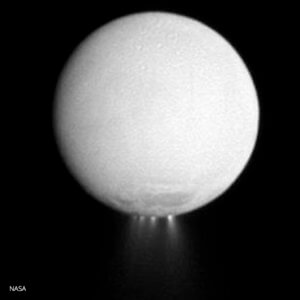Saturn’s moon, Enceladus is producing massive water plumes as well as organic molecules. But does this indicate life is on Saturn’s moon?
Shock Geysers
When massive water geysers were found on Saturn’s moon Enceladus – it was a bit of a shock. These activities were explored by the Cassini probe which also found complex organic chemicals.

Credit: NASA
Scientists seem to think that all that is needed to create life are water, organic molecules and energy despite the fact that just one DNA molecule being created randomly has massive odds stacked against it.
But that’s another story.
Let’s just say the possibilities exist for life on other worlds.
But is it life?
Conditions ‘for life’ are now being found all over the solar system like on Enceladus. Does this mean that life exists there?
Not necessarily.
Enceladus is giving off plumes of water and complex organic molecules. The plumes of water are being powered by the Black Hole Principle – just as they power jets of water in galactic black holes.
Powered from the inside
It’s the same mechanism powering the water jets all the way down at each level, creating intermittent plumes and jets of water.
And I have discussed before, the same principle is responsible for the organic molecules in planetary ejections such as methane from Mars. In fact, we have been finding complex organic molecules coming out of the centres of galaxies just as we would expect if black holes are creating them.
So all this could be created in processes that is devoid of life as we know it. However,
This doesn’t mean necessarily that biological alien life is not on Saturn’s moon, Enceladus as it could also be there as well as displaying Black Hole Principle behaviour.
Do you think we need more evidence before declaring ‘life’ on other worlds?
Please leave a comment below.




Trackbacks/Pingbacks